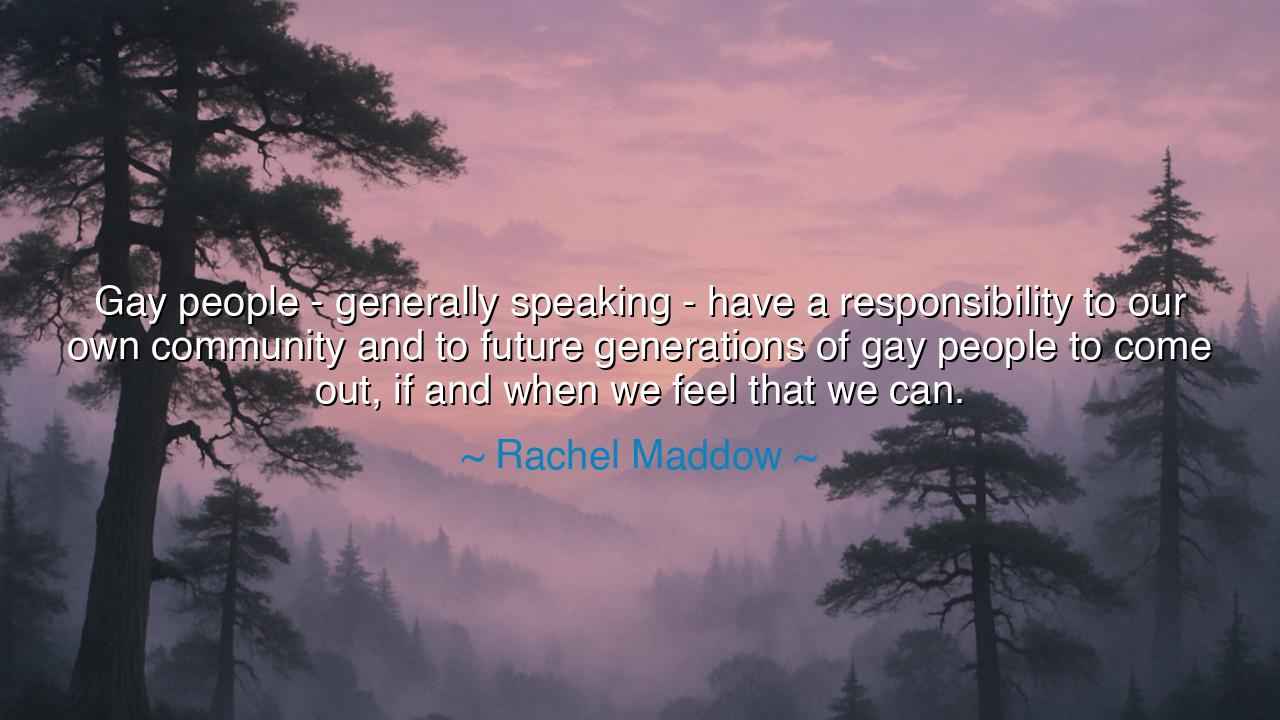
Gay people - generally speaking - have a responsibility to our
Gay people - generally speaking - have a responsibility to our own community and to future generations of gay people to come out, if and when we feel that we can.






The journalist Rachel Maddow once spoke these words of enduring truth: “Gay people — generally speaking — have a responsibility to our own community and to future generations of gay people to come out, if and when we feel that we can.” Beneath this statement lies not only a call to courage, but an invocation of ancient duty — the duty of the living to the unborn, of the free to the still-bound, of the visible to those who dwell in the shadows. For what Maddow speaks of is more than identity; it is the sacred act of visibility, the breaking of silence that once chained entire generations in fear. Her words remind us that to stand in one’s truth is not merely personal liberation — it is a gift to those who will follow.
In the oldest traditions, every generation is said to build a bridge for the next. The warrior defends not only his own life but the peace of his descendants; the sage does not study for himself alone but leaves his wisdom to the young. In this way, Maddow’s call to come out echoes the ancient law of continuity — the eternal duty of each soul to carry the light forward. To “come out” is not simply to announce oneself; it is to declare, “I exist, and I am not ashamed.” It is to light a torch in the dark hallways of history so that others may walk unafraid.
The origin of this truth is written in struggle. For centuries, love between men, love between women, love beyond the simple boundaries of expectation — all these were silenced by fear and law. Yet through every age, a few brave spirits rose to defy that silence. Consider the poet Walt Whitman, whose words in Leaves of Grass carried the tender pulse of forbidden affection. In his time, he could not fully name his truth; still, his poetry whispered it. He became a quiet prophet of authenticity, and from his whisper, future generations found their voice. In this we see the wisdom of Maddow’s message — that each act of truth strengthens the next, and that silence, though safe, leaves the chain unbroken.
And yet, Maddow speaks with compassion — “if and when we feel that we can.” She does not demand reckless heroism but honors the sacred rhythm of readiness. For coming out is not a commandment but a pilgrimage, a journey that begins in the heart. It requires both courage and timing. To those still hiding, she offers not shame, but hope: that one day, they will stand tall in the sunlight. To those who can speak now, she offers responsibility: to open the door, to hold it wide for those behind them.
We may also remember the story of Harvey Milk, one of the first openly gay men elected to public office in the United States. He lived at a time when fear and hatred still ruled the public square. Yet he said, “Hope will never be silent.” By standing before the world as himself, he became a mirror for countless others who thought they were alone. His life was taken by violence, yet his legacy endures because he chose to live honestly. His courage became seed — and from it grew a forest of freedom.
Maddow’s words also speak to the spiritual dimension of community. Each person who comes out strengthens the whole — for truth shared is power multiplied. When one voice breaks the silence, it creates space for another to do the same. Thus the act becomes collective, not solitary; revolutionary, not private. To live openly is to weave one’s life into the great tapestry of authenticity, where no thread is hidden, and every color has meaning.
The lesson here is both timeless and practical: authenticity is service. When you reveal who you truly are, you not only liberate yourself — you teach others that it is possible. Each act of honesty carves a new path through the wilderness of fear. Therefore, let those who can speak, speak. Let those who can stand, stand. Let those who can love, love without disguise. And for those who are not yet ready, let them know that the world is being made safer for them by the courage of others.
For in the end, to come out is not merely to make a statement about the self — it is to declare faith in the future. It is to say to the generations yet unborn, “You will not need to hide as I once did.” And this, above all, is the truest work of a noble heart: to live one’s truth so that others may live more freely. May every soul, in its own time, find the strength to stand in the full light of its being — unguarded, unashamed, and radiant with truth.






AAdministratorAdministrator
Welcome, honored guests. Please leave a comment, we will respond soon